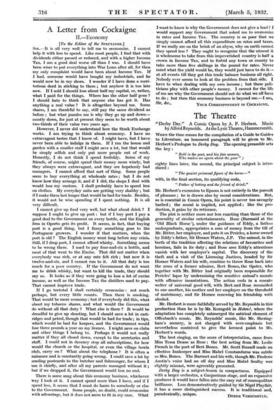The Theatre
"Derby Day." A Comic Opera by A. P. Herbert. Music by Alfred Reynolds. At the Lyric Theatre, Hammersmith.
WHEN the time comes for the compilation of a Guide to Guides to Literature, an honoured paragraph will be given to Mr. Herbert's Prologue to Derby Day. The opening preamble sets the key :
"Bold is the poet, and his fate unsure, Who makes an opera about the poor": eighty lines later, the second, the principal subject is intro- duced: "The quaint primeval figure of the horse--".
with, in the final section, its qualifying coda, "Father of betting and the friend of drink."
Mr. Herbert's excursion to Epsom is not entirely in the pursuit of pleasure ; he is drawn also by moral considerations. But, as is essential in Comic Opera, his point is never too savagely barbed ; the moral is implied, not applied; like the pro- duction, it gains by its reticence.
The plot is neither more nor less exacting than those of the generality of similar entertainments. Rose (Barmaid at the Old Black Horse'), under the guidance of Eddy, a listless undergraduate, appropriates a sum of money from the till of Mr. Bitter, her employer, and puts it on Pericles, a horse owned by Eddy's father, Sir Horace Waters, J.P. The animal, in the teeth of the tradition affecting the relations of favourites and heroines, fails in its duty ; and Rose sees Eddy's attentions vanish with her employer's capital. The discovery of the theft and a visit of the Licensing Justices, headed by Sir Horace Waters and his wife, combine to throw Rose back into the arms of a former admirer, Bert Bones, the tipster, who together with Mr. Bitter had originally been responsible for Pericles' lapse by undermining the sensitive animal's morale with offensive incantations. The action ends in a roseate welter of universal good will, with Bert and Rose reconciled to one another, his mother and her employer on the threshold of matrimony, and Sir Horace renewing his friendship with alcohol.
Mr. Herbert is more faithfully served by Mr. Reynolds in this production than he is by Mr. Komgold in Helen!, where the adaptation has completely submerged the satirical element of Offenbach's music. Mr. Reynolds' music, like Mr. Shering- ham's scenery, is not charged with over-emphasis but nevertheless contrived to give the keenest point to Mr. Herbert's words.
The best singing, on the score of interpretation, came from Miss Tessa Deane as Rose : the best acting from Mr. Leslie French in the part of Bert Bones. Mr. Scott Russell made an effective Innkeeper and Miss Mabel Constanduros was subtle as Mrs. Bones. The Baronet and his wife, though Mr. Frederic Austin's voice had an off day and Miss Mabel Sealby was slightly miscast, were agreeably presented.
Derby Day is a subject-lesson in compactness. Equipped with a larger orchestra, a Gargantuan stage, and an expansive producer it would have fallen into the eaty rut of cosmopolitan brilliance. Less demonstratively guided by Sir Nigel Playfair, it has a more distinguished success. It is traditional and,


















































 Previous page
Previous page